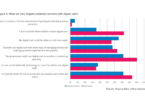Last week, Katie Fortune, senior manager of the central bank digital currency (CBDC) unit at the Bank of England (BofE), suggested that the digital pound will not include government-enabled programmability functions to avoid misperceptions about government overreach. Ms. Fortune was speaking at Citibank’s 10th Annual Digital Money Symposium.
The issue of programmability is a sensitive one in CBDC discussions. The usual argument is that because any government-issued digital currency would be a de facto legal tender – therefore, anyone would have to accept it – CBDCs should be simple, standardized, and not restricted. However, programmability functions could limit usability and impose rules on how people are allowed to spend their money. The BofE believes that if these functions were introduced by design, they could feed people’s misperceptions and reduce trust in the system.
“What we can’t have with public money is some sense that I might decide you are not allowed to spend that on what you want to spend it on, because the government doesn’t approve of what you’re doing,” said Ms. Fortune.
Like the digital euro, the digital pound would not be programmable at its core but programmability can still be implemented by the private sector. A two-tier model with a private sector layer in the middle could build on the BofE’s infrastructure, Ms Fortune argued. This way, it would be private firms that deal with end users. This would allow the BofE to support innovation while maintaining independence.
Ms. Fortune also referred to CBDCs as a potential “bridging asset” between different forms of money. Responding to a question on how CBDCs would interact with things like Bitcoin and stablecoins, she reflected on today’s mixed ecosystem.
“What we have today is that I have a Santander account, and I can go to a cash machine and take out the same cash that my friend with a Barclays account takes out. It’s a sort of bridging asset between them.”
Ms Fortune believes that CBDCs can become a powerful tool in a world of stablecoins and other digital forms of money, particularly due to the risk of fragmentation. She argued that the goal should be for money to have the same level of uniformity as electricity, which has effectively become a neutral public good.
Lastly, Ms. Fortune briefly touched on privacy and fraud prevention tradeoffs. She noted that illicit transactions, identity theft, and other fraudulent activities are important concerns for individuals, but preventing these crimes requires a degree of involvement and identification that will have to be different than with physical cash payments.
CBDCs will not be “anonymous money”, Ms. Fortune said. “However, the objective is that the central bank and the government would not be able to access that information. That would be done by this private sector layer.”






